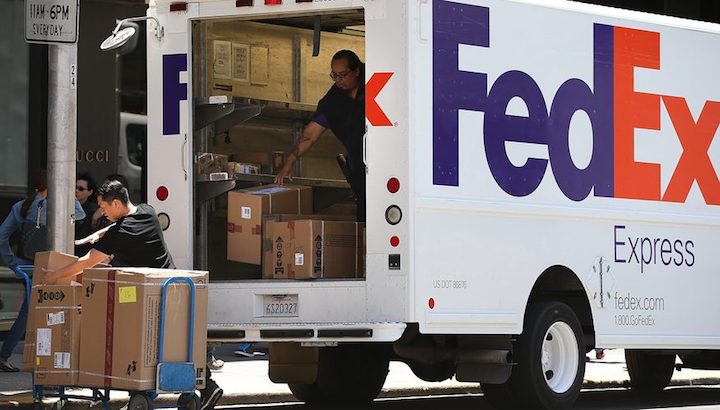FedEx Corp., looking beyond Amazon.com Inc. for growth in e-commerce, is introducing a new late-night shipping option for retailers who want to speedily send orders directly to online customers.
The program will offer retailers the option to deliver items the next day when they are purchased online as late as midnight, said Brie Carere, FedEx’s chief marketing officer. Less than 1.3 percent of the courier’s total revenue comes from Amazon, she said—a figure that hasn’t previously been disclosed. The company doesn’t expect that to increase as it sees better prospects in helping customers compete against the e-retailing behemoth.
“We are not dependent on Amazon for growth,” Carere said. “We’re very optimistic and very, very confident in the growth of the market outside of Amazon.” The executive noted that FedEx sees $550 billion in potential sales in the global markets they’re targeting.
Package couriers face a rising threat from Amazon—which is also one of their biggest customers—as the online giant has begun expanding its own delivery capabilities by leasing aircraft and hiring independent contractors to establish a ground-delivery network. Online sales now make up about 15 percent of U.S. retail, and are growing at three times the pace of traditional brick-and-mortar.
Amazon Competition
FedEx sees potential profit in the competitive pressure online stores face in keeping up with Amazon’s drive to reduce delivery times on purchases. About half of online purchases occur after 4 p.m., Carere said. FedEx’s new extended-hours service seeks to help retailers such as AutoZone Inc. and Best Buy Co. to meet those demands.
Under the program, FedEx Express drivers will pick up packages as late as 2 a.m. from retail stores and take them to sorting hubs. Deliveries can happen as soon as the next day within the local market, and within two days for destinations elsewhere in the U.S.

FedEx began testing the idea in Los Angeles and Dallas in late 2017 and has since rolled it out to 100 markets. The service hasn’t required additional investment or setting up new routes, Carere said.
“We’ve really seen a change in the market where retailers have recognized that their physical distribution is a competitive advantage and it allows them to actually get things faster to market,” she said. “This is from point of fulfillment to delivery, all within a 24-hour cycle. That’s very, very competitive.”
U.S. Market Growth
FedEx expects the U.S. market to jump to 100 million packages a day by 2025, up from 44 million in 2017, and about a quarter of those will be local deliveries. So far, retailers in the program have offered overnight deliveries without requiring a subscription or charging an annual membership fee, Carere said.
“We think this is really the tipping point,” she said. “We think big retailers are really leaning into this and it’s going to provide great differentiation for them.”
Amazon charges $119 for its Prime membership, which gives shoppers free two-day delivery, and in some cases, same-day service









